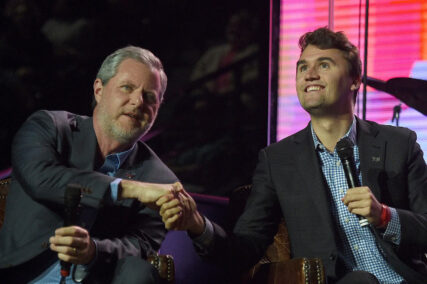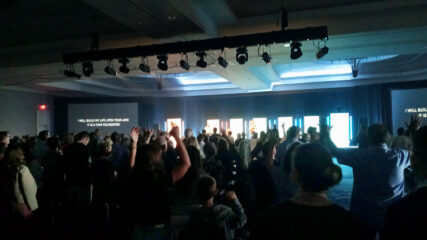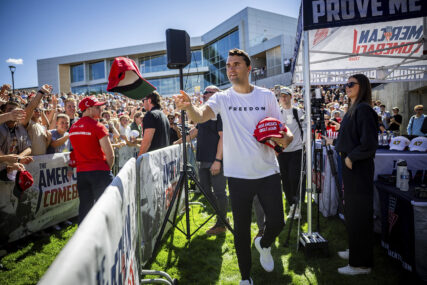(RNS) — A week before he was shot and killed while speaking at an event at Utah Valley University, Charlie Kirk, the head of Turning Point USA, posted to his more than 5 million followers on X, “No civilization has ever collapsed because it prays too much.”
“But a civilization that abandons God will deteriorate and ultimately collapse from the inside out, or because it loses the will to repel a malicious, external force,” Kirk tweeted.
It was one of dozens of religious messages Kirk tweeted or said publicly over the past few years, each promoting an uncompromising form of evangelical Christian faith fused with his famously bellicose political conservatism. Initially known for his work with college students, Kirk’s Christianity became a central part of his public life in recent years. Mentored by and connected with prominent conservative pastors, Kirk’s take on religion seemed to be one he hoped would permeate American society from education to culture to politics.
It was an approach that proved deeply controversial, but also powerful: in the wake of his killing, Kirk leaves behind a vast faith-rooted network of politically active religious leaders that will likely continue to influence politics for years to come.
“Turning Point USA is an organization that is unparalleled on the Christian right today,” said Matthew Taylor, a senior scholar at the Institute for Islamic, Christian, and Jewish Studies in Baltimore.
It’s a somewhat unexpected legacy for Kirk, whose fervent embrace of evangelicalism came near the end of his life. Kirk, who died this week at age 31, grew up attending a congregation in the Chicago suburbs affiliated with the Presbyterian Church (USA), a liberal mainline tradition. It wasn’t until 2019 that his evangelical shift became apparent in his public work, when he joined then-Liberty University President Jerry Falwell Jr. to create the Falkirk Center for Faith and Liberty at the evangelical Christian school.

Jerry Falwell Jr., left, the former president of Liberty University, and Charlie Kirk, the founder of Turning Point USA. (Taylor Irby/The News & Advance, via AP)
While that project ultimately faltered after Falwell was involved with a series of scandals, it was around the same time Kirk met the Rev. Rob McCoy of Godspeak Calvary Chapel in Newbury Park, California. McCoy said the two found common cause in a desire to intermingle their faith with their politics.
“Charlie goes, ‘I didn’t know a guy like you existed,’” McCoy recalled in a 2023 interview with Religion News Service. “And I go ‘What?’ And he goes, ‘A pastor in politics.’”
Godspeak was the first church to invite Kirk to visit as a guest speaker, McCoy said. Soon, the two began organizing what would become Turning Point USA Faith, a religion-focused TPUSA project.
Matthew Boedy, a professor at the University of North Georgia who has studied TPUSA, said McCoy pushed Kirk to embrace a specific theology known as the Seven Mountains Mandate, an evangelical movement revolving around the idea that Christians should influence seven “mountains” of society — family, religion, education, media, entertainment, business and government.
“(Kirk) then moved Turning Point into all those seven areas,” said Boedy, author of the forthcoming book “The Seven Mountains Mandate: Exposing the Dangerous Plan to Christianize America and Destroy Democracy.”
By 2020, Kirk was referring to the concept publicly and tying it directly to his political projects. While discussing President Donald Trump at that year’s Conservative Political Action Conference, Kirk exclaimed to the crowd, “Finally we have a president that understands the seven mountains of cultural influence.”
Kirk would invoke the phrase rarely over the next few years, but he became a fixture in a broader effort to create a distinctly conservative Christian America, with TPUSA leaning harder into faith. By 2023, some churches openly affiliated with the organization on their websites. That year, a Turning Point Academy initiative offering “both a classic, pro-American curriculum as well as a Christian educational programming option” listed nearly 20 affiliated schools, many of them Christian.
One church in particular became a launching pad for Kirk’s religious work: Dream City Church in Phoenix, near where Kirk lived. For a time, Kirk hosted monthly “Freedom Night in America” events at the megachurch, a model that was eventually replicated at other houses of worship.
By 2023, TPUSA Faith was hosting conferences for pastors, encouraging them to preach far-right politics from the pulpit as part of a church-growth strategy. Boedy said he attended Turning Point’s most recent pastors’ summit this summer in Georgia and was struck by the spectrum of faith leaders who traveled from across the state to attend.

Attendees sing along wih the band at a Turning Point USA event earlier this year. Photo courtesy Caleb Campbell
“What Turning Point was doing at Dream City and these Freedom Nights and at different pastor summits, I think the people (Kirk) brought there really helped the people in the audience — and the audience’s pastors — to see how they could do politics from the pulpit that they weren’t doing before,” Boedy said.
Kirk’s own brand of faith was deeply conservative and often appeared infused with forms of Christian nationalism. In a public appearance he promoted on his X feed, Kirk argued the “body politic” of the United States at its founding was so Protestant that the “structure of government was built for the people who believed in Christ our Lord.” He then argued the U.S. requires a Christian populace to properly function.
“One of the reasons we’re living through a Constitutional crisis is that we no longer have a Christian nation, but we have a Christian form of government, and they’re incompatible,” he said. “You cannot have liberty if you do not have a Christian population.”
Much like his famously debate-focused politics, Kirk’s public religious appeals could be similarly contentious. He criticized religious leaders whom he disagreed with, such as Civil Rights leader the Rev. Martin Luther King Jr., who Kirk, in a 2023 appearance, derided as “awful” and “not a good person.” He also urged followers to pressure otherwise like-minded faith leaders who stopped short of embracing his politics to do so, such as when he chided pastors for not doing more to resist COVID-19 pandemic restrictions on churches or condemn abortion.
“If you are a pastor and you are not speaking out for pro-life ideas and policies and politicians, you should resign from the ministry, because every pastor needs to be speaking out about abortion in their church,” Kirk said in 2024 while speaking at a conference at Dream City. He later added, “How many of you know a weak pastor that needs to be confronted by a believer and say, either you need to lead, follow, or get out of the way — and preach the word, or not be a pastor any longer?”
Kirk also voiced frustration in a debate over Catholicism while speaking with Michael Knowles, a conservative political commentator, at TPUSA’s America Fest late last year. In a cordial but sometimes tense back-and-forth with Knowles, who is Catholic, Kirk referred to then-Pope Francis as a “Marxist” and suggested the pontiff was a heretic.

Charlie Kirk hands out hats before speaking at Utah Valley University in Orem, Utah, Sept. 10, 2025. (Tess Crowley/The Deseret News via AP)
Boedy noted he has personal experience with Kirk’s willingness to single out opponents: Boedy was placed on a TPUSA “professor watch list” in 2016 for writing an editorial opposing legislation that would allow concealed weapons on college campuses.
Meanwhile, Kirk sometimes sparred with opponents further to his right, both politically and religiously. Nick Fuentes, known for extremist rhetoric that conflates white nationalism and Christian nationalism, feuded with Kirk for years, accusing him of being inadequately conservative. In 2019, followers of Fuentes — sometimes called “Gropyers” — regularly disrupted Kirk’s campus events.
But even when steeped in theological debate, Taylor and Boedy both said Kirk was focused on building a winning political coalition. He routinely worked with people he disagreed with theologically — including Knowles — so long as they overlapped with his right-wing political vision. The result was building an influential network of conservative Christian pastors, leaders, churches and schools in a shockingly short amount of time.
That coalition has mourned Kirk’s killing with a zeal he long modeled. In the hours following his death, faith leaders and politicians alike — including Trump — declared Kirk not just a victim of political violence, but a martyr.
It’s that kind of fervor, experts say, that will likely keep Kirk’s religious network a force to be reckoned with for some time.
“I’d argue there might not be a more important institution on the religious right, right now,” than Turning Point Faith and Turning Point USA, Taylor said.



